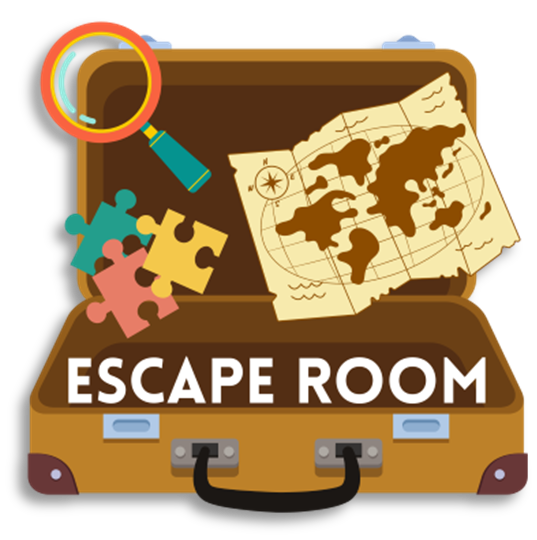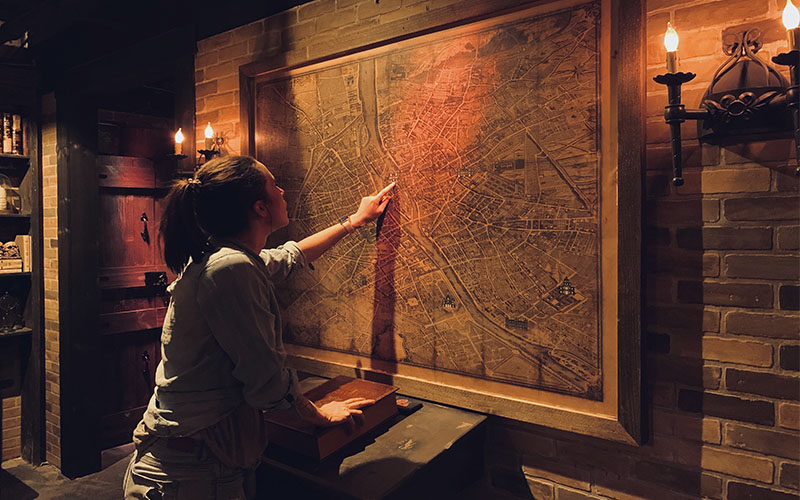Examination Your Wits at the Escape Room Seattle WA: Fun for All Ages
Examination Your Wits at the Escape Room Seattle WA: Fun for All Ages
Blog Article
Obstacle Your Mind With Our Intriguing Escape Room Puzzles and Clues
Getting started on a getaway room experience offers a complex experience that blends cognitive obstacles with immersive storytelling. Each area, carefully crafted with one-of-a-kind styles, attracts participants right into a globe where logic, monitoring, and physical puzzles assemble.
The Art of Problem Style
The art of problem design in getaway areas is a creative and careful procedure that requires a deep understanding of both cognitive and psychological involvement. Crafting a successful challenge entails balancing complexity with solvability, making certain that participants stay tested yet not bewildered. This balance is vital, as it fosters a sense of accomplishment and promotes ongoing engagement.
Problem developers must think about numerous cognitive abilities, such as pattern acknowledgment, deductive reasoning, and spatial understanding. These aspects need to be intertwined seamlessly within the narrative of the escape space, boosting the immersive experience. Emotional interaction is similarly crucial; problems need to evoke curiosity, excitement, and periodic aggravation, inspiring individuals to persist and inevitably do well.
Focus to information is extremely important. Every idea, prop, and device has to be diligently made and tested to ensure functionality and comprehensibility within the story. Developers usually repeat on their developments, integrating feedback from examination teams to fine-tune problem levels and eliminate obscurities.

Kinds Of Escape Room Challenges
Comprehending the complexities of challenge style naturally leads to an exploration of the varied sorts of difficulties run into in escape rooms. These challenges can be broadly categorized into physical puzzles, reasoning problems, and empirical problems, each offering one-of-a-kind kinds of involvement and cognitive excitement.
Physical challenges need participants to communicate with their environment, frequently involving jobs such as setting up items, controling systems, or uncovering hidden areas. These obstacles involve tactile detects and spatial thinking, motivating teamwork and hands-on problem-solving.
Reasoning challenges, on the other hand, need logical thinking and pattern recognition. Individuals could be charged with decoding ciphers, solving mathematical troubles, or discovering connections in between relatively unrelated ideas - escape room seattle wa. These problems are developed to test the gamers' deductive reasoning and intellectual expertise
Observational puzzles rely upon keen focus to detail. Gamers should inspect their environments to identify refined hints, disparities, or hidden messages. These obstacles typically necessitate an eagle eye and an ability to view connections that others could neglect.
Strategies for Success
Accomplishing success in escape spaces calls for a thoughtful blend of approach and partnership. Synergy is critical; gamers have to take advantage of their cumulative toughness to solve complex puzzles efficiently. Splitting jobs according to individual skills can simplify the process-- those with a propensity for pattern acknowledgment can deal with aesthetic problems, while logical thinkers deal with puzzles and sequences.
Reliable interaction is one more keystone of success. Sharing explorations promptly stops copied initiatives and ensures everyone stays on the exact same web page. Making use of a main location to position found objects can assist track development and prevent missing out on critical clues.
Time management is similarly important. Allot a details quantity of time per problem, avoiding prolonged concentrate on any single challenge. If progress stalls, seeking or switching puzzles assistance from colleagues can give fresh discover this viewpoints.
It's also beneficial to acquaint oneself with usual getaway space themes and puzzle kinds beforehand. Understanding potential problem layouts, such as ciphers or lock mixes, can speed up analytical.
Finally, keeping a positive and composed attitude under stress can dramatically affect performance. Stress can shadow judgment, so preserving calm ensures clear reasoning and effective collaboration, bring about a higher likelihood of efficiently getting away.

Advantages of Escape Rooms
Taking part in retreat areas supplies a plethora of advantages that expand past plain amusement. These immersive experiences act as a durable system for establishing important reasoning and analytical skills. Participants are required to analyze clues, recognize patterns, and design remedies under time restraints, promoting mental agility and cognitive flexibility.
In addition, retreat spaces are a powerful tool for boosting team effort and communication. The collaborative nature of these tasks demands efficient communication and control amongst staff member. This setting motivates participants to express their thoughts clearly, pay attention actively, and job synergistically in the direction of a typical goal, therefore enhancing interpersonal abilities.
Moreover, getaway rooms give an exceptional opportunity for stress alleviation and mental rejuvenation. The gripping nature of the difficulties allows individuals to divert their emphasis from everyday stressors, advertising a sense of success you can try these out and wellness upon solving the problems. This can result in boosted mental health and boosted productivity in various other areas of life.
Last but not least, these experiences typically require imaginative thinking and ingenuity, which can translate into cutting-edge analytical capacities in expert settings. By participating in getaway areas, individuals can refine a diverse skill established that applies in numerous real-world scenarios, making them a useful addition to any type of individual or professional development plan.
Popular Themes and Situations
Delving into the varied globe of escape rooms exposes a myriad of preferred themes and situations that astound participants and heighten the immersive experience. Amongst one of the most precious themes are those that deliver gamers right into historical periods or fantastical worlds. Ancient Egyptian tombs, medieval castles, and pirate experiences are perennial favorites, enabling participants to resolve challenges within richly comprehensive settings that evoke a sense of adventure and discovery.
One more common motif is the mystery and detective category, where players discover themselves in the role of sleuths solving a crime or uncovering secrets. These scenarios often include detailed stories and a collection of interconnected hints that require eager monitoring and deductive thinking to decipher.
Additionally, sci-fi and scary styles hold considerable appeal, attracting on the intrigue of advanced innovation or the adventure of browsing haunted residences and labs. These circumstances often incorporate innovative props and unique effects, boosting the realistic look and tension.
Last but not least, lots of escape areas draw inspiration from preferred culture, developing experiences based upon beloved publications, films, or television shows. This can create a feeling of familiarity and exhilaration, as participants involve with scenarios that admire their favorite stories.
Conclusion
The complex style of getaway area puzzles and clues uses an one-of-a-kind mix of cognitive challenges and immersive storytelling. By engaging in different kinds of physical, sensible, and empirical puzzles, participants refine important reasoning and synergy abilities.
Each area, meticulously crafted with unique motifs, attracts individuals right into a globe where reasoning, monitoring, and physical problems merge.The art of problem layout in retreat areas is a thorough and imaginative procedure that calls for a deep understanding of both cognitive and psychological involvement. Crafting an effective challenge includes balancing complexity with solvability, guaranteeing that participants remain challenged yet not bewildered. The gripping nature of the obstacles enables individuals to divert their focus from daily stress factors, advertising a feeling of achievement and well-being upon resolving the puzzles.The detailed layout of getaway space puzzles and ideas supplies a special blend of cognitive home challenges and immersive narration.
Report this page